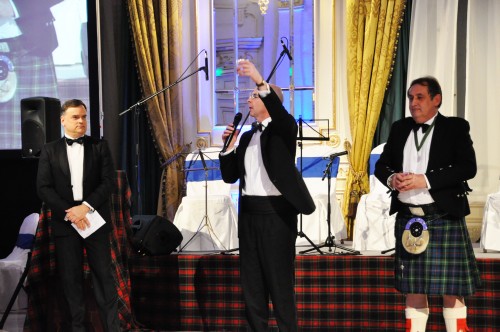27th January 2014 Budapest, Hungary
Better Together
It’s been quite a start to 2014. No chance of easing my way back into work after the holidays. The year has got going at 100 miles an hour.
I was wondering which part of the excitement to write about in my first blog of 2014. But I went to a celebration of Burns night on Saturday organised by the Robert Burns International Foundation in Hungary. And that decided me.

A friend of mine, sitting nearby, teased me that this time next year I might not be invited. The Scottish Ambassador would go instead. Of course he was referring to the referendum on Scottish independence which will be held in September. Now I like a joke and don’t mind being teased (don’t give it unless you can take it, right?). But after I’d had a good laugh, I got into quite a serious conversation about the referendum.
It’s something I feel very strongly about and which I think is a real risk to the prosperity and future of the people of Scotland and the rest of the UK. Now at the Burns dinner we ended our conversation with a glass of whisky (scotch naturally) and moved on to other things including some Scottish dancing. But my thoughts turn back to the referendum and I’d like to share them with you.
In films and sport it’s great that we can celebrate the differences between the Scottish people and the rest of us citizens of the UK. We can revel in the rivalry of our rugby teams, or in Mel Gibson’s version of William Wallace putting the sword to the English army in Braveheart. Whatever the roots and however dodgy the historic references.
But when we move from there to a real option for Scotland to take full independence it stops being fun and becomes deadly earnest. Let’s remember that Scotland has it’s devolved government already – and so the decisions which are best taken in Scotland are made in Edinburgh, not London. But the question is not whether there are more powers which should move North. But whether we should completely separate our countries.
Now I don’t doubt that there are some who a fully independent Scotland would suit very well. We hear from them often. But the evidence is pretty clear that for the people of Scotland and for those in the rest of the UK, independence would be a great leap backwards. And the biggest losers would be the people of Scotland. I don’t want in a blog to try to offer full arguments. But the most telling facts for me are that:
- The UK delivers for Scotland at an international level. As a major player in the UN Security Council, NATO and the EU, the UK carries influence through its international alliances and world class armed forces that not only help to protect us all, but also generate jobs. An independent Scotland would have to make many compromises along the way and from a weaker position as a smaller, less influential country.
- An independent Scotland would face tough negotiations on terms of EU membership
- Scottish taxpayers are likely to pay more into the EU budget than they get back
- The UK’s single market brings economic benefits to Scotland and the rest of the UK. If it fragmented after Scottish independence, Scotland’s smaller economy would be disproportionately affected.
- Any reduction in intra-British trade and investment following erosion of the single market would be felt in the rest of the UK as well as in Scotland. Given the disparity in size between the Scottish economy and the rest of the UK economy, the effect on the rest of the UK as a whole would be much smaller than that on Scotland.
Take a look at the Scottish referendum information pack for more on the benefits of Scotland remaining in the UK.
The only way that Scottish independence can be properly debated is if these facts, and others, are properly aired and understood by all. I really hope that happens. And was pleased to see the British government has published papers which spell out the (hugely unfortunate) consequences of independence.
I worry that instead of that many will be swayed by sporting emotion, by references to clashes between our countries over 200 years ago. And by Hollywood dramatics and Mr Gibson with his face painted blue and white.
Much better to think of what the decision will mean in real terms to our children. Much better to be ruled by head, not heart. Much better to realise that we are better together.